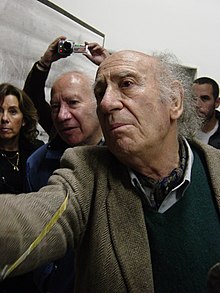Loading AI tools
Chilean painter From Wikipedia, the free encyclopedia
José Balmes Parramón (20 January 1927 – 28 August 2016[1]) was a Spanish-born painter based in Chile. He received Chile's National Prize for Plastic Arts in 1999.
José Balmes | |
|---|---|
 2007 | |
| Born | José Balmes Parramón 20 January 1927 Montesquiu, Spain |
| Died | 28 August 2016 (aged 89) Santiago, Chile |
| Nationality | Chilean |
| Alma mater | University of Chile |
| Occupation | Painter |
| Political party | Communist Party of Chile |
| Spouse | Gracia Barrios |
| Children | 1 |
| Awards |
|


José Balmes was born in 1927 in the town of Montesquiu in Catalonia, where he spent his childhood until the Spanish Civil War broke out in 1936. Three years later, after the Nationalist victory, Balmes with his family was forced to leave Spain due to the militancy of his father, Damià Balmes, who was mayor of the town for the Republican Left of Catalonia.
He traveled to Chile on the SS Winnipeg,[1] after the aid of that country's government to the Spanish Republicans. In what would become his new homeland, Balmes completed secondary education at the Liceo Barros Borgoño, and in 1943 he entered the School of Fine Arts of the University of Chile. There he had Pablo Burchard and Camilo Mori as teachers. In 1947 he obtained Chilean nationality.
At the university, he interacted with other artists, including future National Arts Prize winner Gracia Barrios, whom he would marry in 1952. The couple had a daughter, Concepción Balmes, who is also a painter.[2]
Balmes would continue to be linked to the University of Chile as an academic (1950–1973) and dean of the Faculty of Arts (1972–1973). Among his disciples is Patricio Court, who was his student of painting, as well as Francisco Brugnoli, Eugenio Dittborn, Patricia Israel, and Eugenio Téllez.
Along with Gracia Barrios and other artists, he would form the informalist Grupo Signo, with whom he would present works in Barcelona, Madrid, and Paris.[2]
Of known communist militancy, and having been for several periods a member of the Communist Party's Central Committee,[3] a large part of Balmes' career was linked to political life, actively supporting the Popular Unity government led by Salvador Allende, and having to leave for exile in France after the 1973 coup d'état.[4] There he continued developing his artistic career as a professor at Pantheon-Sorbonne University.[5]
In 1986, Balmes returned to Chile, after which he received multiple awards, such as the 1999 National Prize for Plastic Arts and the 2002 Altazor.[4]
In 2012 the Chilean filmmaker Pablo Trujillo Novoa shot a documentary about the life of the artist entitled Balmes: El doble exilio de la pintura (Balmes: Painting's Double Exile).[6]
José Balmes died on 28 August 2016 at the Clínica Las Condes, where he had been hospitalized for pneumonia since the beginning of that month.[1][7]
Seamless Wikipedia browsing. On steroids.
Every time you click a link to Wikipedia, Wiktionary or Wikiquote in your browser's search results, it will show the modern Wikiwand interface.
Wikiwand extension is a five stars, simple, with minimum permission required to keep your browsing private, safe and transparent.